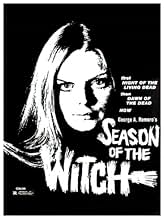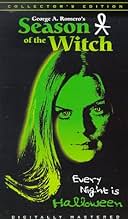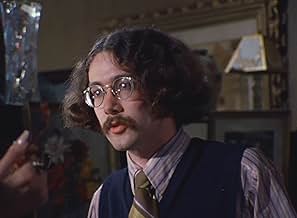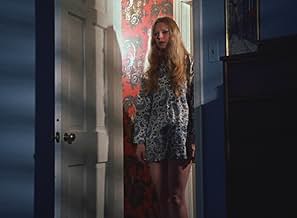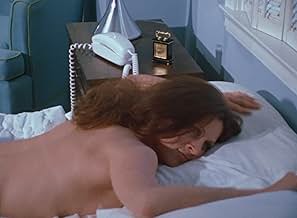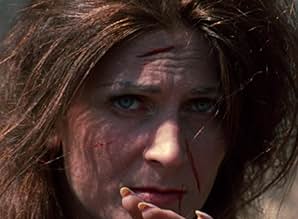IMDb RATING
5.6/10
4.2K
YOUR RATING
A neglected, unhappy suburban housewife gets mixed up in witchcraft with unexpected consequences.A neglected, unhappy suburban housewife gets mixed up in witchcraft with unexpected consequences.A neglected, unhappy suburban housewife gets mixed up in witchcraft with unexpected consequences.
Raymond Laine
- Gregg
- (as Ray Laine)
Robert Trow
- Detective Mills
- (as Bob Trow)
Lynda Marnoni
- Patty
- (as Linda Creagan)
S. William Hinzman
- The Intruder
- (as Bill Hinzeman)
- Director
- Writer
- All cast & crew
- Production, box office & more at IMDbPro
Featured reviews
This is one of my favorite films of all time. Joan, who seems to be suffering from a midlife crisis, breaks away from her world of therapy, bridge and cocktail parties and becomes involved in witchcraft. We never know if she REALLY has magical powers or not. Her nightmares and fantasies remind one of Roman Polanski's "Repulsion." In the end, Joan seems to finally have it all together. A definite must-see for any true Romero fan.
Ranks right up there with "The Witch Who Came From the Sea" and "The Stepford Wives" in the obsolete sub-genre of 70's women's lib horror. Arguably George Romero's most unusual and underrated film, this is less a horror film than a sociopolitical bitchslapping of the male-dominated American dream. Although witchcraft does play a part in this, the focus is largely on our leading lady's middle-aged, menopausal anguish...a feeling of solitary confinement in a pseudo-sterile life with an abusive/absent husband, thankless daughter, and a circle of ingenuine, gossipy "friends".
This is a very well done low-budget film, and comes highly recommended...although rigid horror buffs may end up disappointed. 7/10
This is a very well done low-budget film, and comes highly recommended...although rigid horror buffs may end up disappointed. 7/10
To get the most out of 'Season Of The Witch' ignore the horror tag and put Romero's zombie movies out of your mind. This is more of a character study cum social document of an early 70s bored housewife's attempt to find meaning in her life. Faced with dull bourgeois conformity on one side, and a counter-culture that offers no real answers on the other, she eventually finds her own direction. Low budget, variable performances and all, I still found this to be a much more complex and accomplished movie than Romero's most recent effort 'Bruiser'. While it doesn't impress as much as his overlooked vampire gem 'Martin' (which shares certain similarities in approach and theme), it's not to be dismissed. It may not be entirely successful, but I highly recommend it.
In the years between his legendary "Night of the Living Dead" and his outbreak thriller "The Crazies", filmmaker George A. Romero was actually trying NOT to get pigeonholed as a horror director. This is one of his efforts from that era. It's not for hardcore horror fans; other than a few nightmare sequences, it barely flirts with that genre. It's more of a sometimes arty, sometimes exploitative drama about a suburban housewife named Joan Mitchell (Jan White). Rather dissatisfied with her lot in life, she begins to think about things such as extramarital sex, and the idea of dabbling in the occult.
The performances are better than one might expect for such an independent, regional production. Romero uses his script as a set-up for exploring themes such as self esteem & self expression, female oppression, and the generation gap. For a while, it's likely to cause some audience members to be regularly checking their watches, as it rambles on at too deliberate a pace. It begins to maintain interest more consistently after the one hour mark. Regarding its artistic ambitions, Romero does seem to be enjoying himself coming up with those dream sequences. And in terms of exploitative elements, there is nudity both female and male, but never very much violence or gore.
"Hungry Wives" is fairly serious, but not totally without humor. Fans of the directors' output may want to see it for completions' sake, but it's not going to be for every taste.
Six out of 10.
The performances are better than one might expect for such an independent, regional production. Romero uses his script as a set-up for exploring themes such as self esteem & self expression, female oppression, and the generation gap. For a while, it's likely to cause some audience members to be regularly checking their watches, as it rambles on at too deliberate a pace. It begins to maintain interest more consistently after the one hour mark. Regarding its artistic ambitions, Romero does seem to be enjoying himself coming up with those dream sequences. And in terms of exploitative elements, there is nudity both female and male, but never very much violence or gore.
"Hungry Wives" is fairly serious, but not totally without humor. Fans of the directors' output may want to see it for completions' sake, but it's not going to be for every taste.
Six out of 10.
Good Gravy! This is an odd movie. It's kind of like the bored-housewives-turn-on schlock released by Something Weird Video, except it's done as a "serious" movie. Plus, it's advertised as a horror movie because it was directed by George A. Romero, he of "Dawn of the Dead" fame. I watched the Anchor Bay special edition of this flick- the name on the video box is "Season of the Witch", the actual movie has the title "Jack's Wife", and in the theatrical trailer included on the tape the movie is called "Hungry Wives". But ignoring all that, I enjoyed most of this movie. The actors are all good, and the movie is packed with great dream sequences. The proof that this movie is above average is that it can use the tired "waking up from one dream only to find that you're still dreaming" device skillfully.
The plot concerns a bored housewife whose husband ("Jack", I guess) occasionally smacks her around, telling her she needs to "kick some ass" (he says that a lot). She's got a super-cute red head daughter who introduces her to a trippy stoner who turns her on to a swingin' life style. This movie's strongest scenes are the ones concerning Jack's Wife's growing hatred of her dull life and friends.
Although Jack's Wife and her booze-guzzling friends go to see a woman who practices witchcraft, but that's not really a big part of the movie. The "Season of the Witch" title comes from the inclusion of a song, performed by Donovan, with that title. This song, played loudly over a throw-away scene, sounds as if it was recorded by one group sans Donovan, and then they played it over the radio and recorded Donovan singing out of rhythm with it. It's very, very bizarre.
But anyway, this was an obscure little gem that I really liked, and it gets bonus points for including a scene with Mad Libs.
The plot concerns a bored housewife whose husband ("Jack", I guess) occasionally smacks her around, telling her she needs to "kick some ass" (he says that a lot). She's got a super-cute red head daughter who introduces her to a trippy stoner who turns her on to a swingin' life style. This movie's strongest scenes are the ones concerning Jack's Wife's growing hatred of her dull life and friends.
Although Jack's Wife and her booze-guzzling friends go to see a woman who practices witchcraft, but that's not really a big part of the movie. The "Season of the Witch" title comes from the inclusion of a song, performed by Donovan, with that title. This song, played loudly over a throw-away scene, sounds as if it was recorded by one group sans Donovan, and then they played it over the radio and recorded Donovan singing out of rhythm with it. It's very, very bizarre.
But anyway, this was an obscure little gem that I really liked, and it gets bonus points for including a scene with Mad Libs.
Did you know
- TriviaAccording to director George A. Romero, in the commentary track he did for The Crazies (1973) in 2002, this is the only one of his films he'd like to remake. He cited lack of money as a reason for unhappiness with this production as it turned out.
- GoofsThe name on the MasterCharge card Joan uses to buy her witchcraft supplies is "George A Romero".
- Quotes
Shirley: [reading from the Witchcraft primer] 'The religion offers, further, a retreat for emotional women, repressed women, masculine women and those suffering from personal disappointment or nervous maladjustment.' Christ, what other kind of women are there? No wonder this stuff's getting so damn popular.
- Alternate versionsOriginally filmed and released in 1971 under the title "Hungry Wives" which ran at 130 minutes, the movie was re-edited for foreign distribution and re-released as "Jack's Wife" a year later, running at 104 minutes. In response to George A. Romero's successful release of "Creepshow" in 1982, "Jack's Wife" was released on home video as "Season of the Witch" with the running time trimmed further to 89 minutes. The current video version runs 104 minutes which is the original overseas version titled "Jack's Wife."
- ConnectionsFeatured in The Dead Will Walk (2004)
- SoundtracksSeason of the Witch
Written and Performed by Donovan
- How long is Season of the Witch?Powered by Alexa
Details
Box office
- Budget
- $90,000 (estimated)
Contribute to this page
Suggest an edit or add missing content


